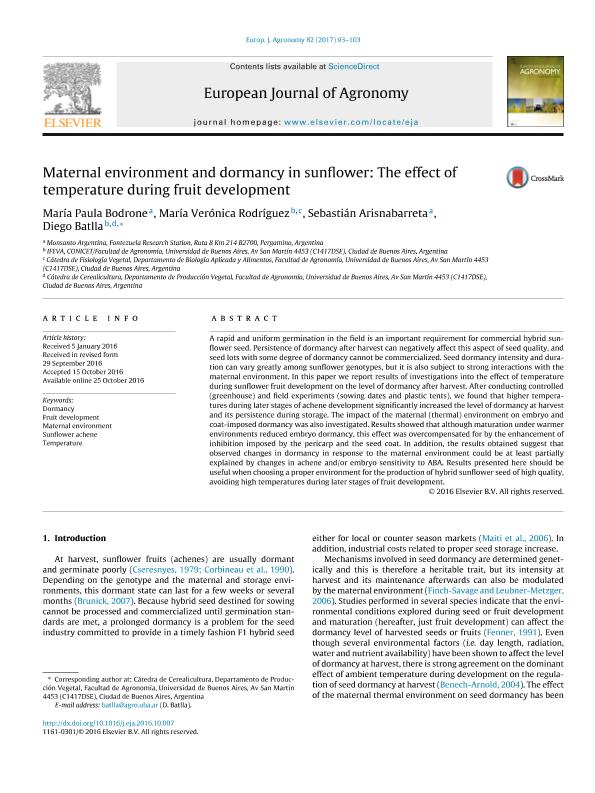Mostrar el registro sencillo del ítem
dc.contributor.author
Bodrone, María Paula
dc.contributor.author
Rodríguez, María Verónica

dc.contributor.author
Arisnabarreta Dupuy, Sebastián

dc.contributor.author
Batlla, Diego

dc.date.available
2018-06-19T20:22:30Z
dc.date.issued
2017-01
dc.identifier.citation
Bodrone, María Paula; Rodríguez, María Verónica; Arisnabarreta Dupuy, Sebastián; Batlla, Diego; Maternal environment and dormancy in sunflower: The effect of temperature during fruit development; Elsevier Science; European Journal of Agronomy; 82; Parte A; 1-2017; 93-103
dc.identifier.issn
1161-0301
dc.identifier.uri
http://hdl.handle.net/11336/49458
dc.description.abstract
A rapid and uniform germination in the field is an important requirement for commercial hybrid sunflower seed. Persistence of dormancy after harvest can negatively affect this aspect of seed quality, and seed lots with some degree of dormancy cannot be commercialized. Seed dormancy intensity and duration can vary greatly among sunflower genotypes, but it is also subject to strong interactions with the maternal environment. In this paper we report results of investigations into the effect of temperature during sunflower fruit development on the level of dormancy after harvest. After conducting controlled (greenhouse) and field experiments (sowing dates and plastic tents), we found that higher temperatures during later stages of achene development significantly increased the level of dormancy at harvest and its persistence during storage. The impact of the maternal (thermal) environment on embryo and coat-imposed dormancy was also investigated. Results showed that although maturation under warmer environments reduced embryo dormancy, this effect was overcompensated for by the enhancement of inhibition imposed by the pericarp and the seed coat. In addition, the results obtained suggest that observed changes in dormancy in response to the maternal environment could be at least partially explained by changes in achene and/or embryo sensitivity to ABA. Results presented here should be useful when choosing a proper environment for the production of hybrid sunflower seed of high quality, avoiding high temperatures during later stages of fruit development.
dc.format
application/pdf
dc.language.iso
eng
dc.publisher
Elsevier Science

dc.rights
info:eu-repo/semantics/openAccess
dc.rights.uri
https://creativecommons.org/licenses/by-nc-sa/2.5/ar/
dc.subject
Dormancy
dc.subject
Fruit Development
dc.subject
Maternal Environment
dc.subject
Sunflower Achene
dc.subject
Temperature
dc.subject.classification
Otras Ciencias Biológicas

dc.subject.classification
Ciencias Biológicas

dc.subject.classification
CIENCIAS NATURALES Y EXACTAS

dc.title
Maternal environment and dormancy in sunflower: The effect of temperature during fruit development
dc.type
info:eu-repo/semantics/article
dc.type
info:ar-repo/semantics/artículo
dc.type
info:eu-repo/semantics/publishedVersion
dc.date.updated
2018-06-19T15:54:48Z
dc.identifier.eissn
1873-7331
dc.journal.volume
82
dc.journal.number
Parte A
dc.journal.pagination
93-103
dc.journal.pais
Países Bajos

dc.journal.ciudad
Amsterdam
dc.description.fil
Fil: Bodrone, María Paula. Monsanto Argentina; Argentina
dc.description.fil
Fil: Rodríguez, María Verónica. Consejo Nacional de Investigaciones Científicas y Técnicas. Oficina de Coordinación Administrativa Parque Centenario. Instituto de Investigaciones Fisiológicas y Ecológicas Vinculadas a la Agricultura. Universidad de Buenos Aires. Facultad de Agronomía. Instituto de Investigaciones Fisiológicas y Ecológicas Vinculadas a la Agricultura; Argentina. Universidad de Buenos Aires. Facultad de Agronomía. Departamento de Biología Aplicada y Alimentos. Cátedra de Fisiología Vegetal; Argentina
dc.description.fil
Fil: Arisnabarreta Dupuy, Sebastián. Monsanto Argentina; Argentina
dc.description.fil
Fil: Batlla, Diego. Consejo Nacional de Investigaciones Científicas y Técnicas. Oficina de Coordinación Administrativa Parque Centenario. Instituto de Investigaciones Fisiológicas y Ecológicas Vinculadas a la Agricultura. Universidad de Buenos Aires. Facultad de Agronomía. Instituto de Investigaciones Fisiológicas y Ecológicas Vinculadas a la Agricultura; Argentina. Universidad de Buenos Aires. Facultad de Agronomía. Departamento de Biología Aplicada y Alimentos. Cátedra de Fisiología Vegetal; Argentina
dc.journal.title
European Journal of Agronomy

dc.relation.alternativeid
info:eu-repo/semantics/altIdentifier/url/https://www.sciencedirect.com/science/article/pii/S1161030116302027
dc.relation.alternativeid
info:eu-repo/semantics/altIdentifier/doi/https://doi.org/10.1016/j.eja.2016.10.007
Archivos asociados
